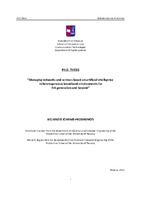Managing networks and services based on artificial intelligence in heterogeneous broadband environments for 5th generation and beyond

Doctoral Thesis
Συγγραφέας
Μπελικαΐδης, Ιωάννης - Πρόδρομος
Belikaidis, Ioannis - Prodromos
Ημερομηνία
2021-09Προβολή/
Λέξεις κλειδιά
Διαχείριση δικτύων και υπηρεσιών ; Διαχείριση πόρων ραδιοσυχνοτήτων ; Τεχνητή νοημοσύνη ; Νοητός διαχωρισμός δικτύων ; Περιβάλλοντα 5ης γενιάς και ακόλουθων γενεών ; Δίκτυα πλέγματος ; Ποιότητα υπηρεσιών ; Ποιότητα εμπειρίας χρήστη ; Υπερ-πυκνά δίκτυαΠερίληψη
Tα κίνητρα αυτής της ερευνητικής δραστηριότητας προέρχονται από το γεγονός της εκθετικής αύξησης της ζήτησης δεδομένων που παρατηρείται τα τελευταία χρόνια καθώς και στην προσέγγιση των θεωρητικών ορίων του capacity των δικτύων. Ταυτόχρονα η διαδικασία της αδειοδότησης και της απόκτησης νέων συχνοτήτων είναι ακριβή, χρονοβόρα και σε ορισμένες περιπτώσεις η αδειοδότηση είναι αδύνατη για πολλούς παρόχους. Σε συνδυασμό με την υποστήριξη του μεγάλου όγκου δεδομένων που προκαλούνται από τις καινούριες υπηρεσίες και εφαρμογές, πραγματοποιήθηκε έρευνα, βρέθηκαν, υλοποιήθηκαν και δοκιμάστηκαν λύσεις για την βέλτιστη διαχείριση των δικτύων. Η παρούσα διπλωματική εργασία διαρθρώνεται σε κεφάλαια και κάθε κεφάλαιο παρέχει μια λεπτομερή περιγραφή και τα αποτελέσματα των διεξαγόμενων ερευνητικών δραστηριοτήτων για την επίτευξη του γενικού στόχου διαχείρισης δικτύων και υπηρεσιών βασισμένων στην τεχνητή νοημοσύνη σε ετερογενή ευρυζωνικά περιβάλλοντα για 5η γενιά και μετά. Το Κεφάλαιο 1 παρέχει την κύρια εισαγωγή και το κίνητρο της εργασίας μας και θέτει τις απαιτήσεις της απαραίτητης έρευνας για τη διαχείριση δικτύων και υπηρεσιών που βασίζονται στην τεχνητή νοημοσύνη. Το Κεφάλαιο 2 διερευνά και αξιολογεί δίκτυα πλέγματος για την επίτευξη βελτιωμένης απόδοσης, ακόμη και όταν η συνδεσιμότητα είναι δύσκολο να πραγματοποιηθεί. Το Κεφάλαιο 3 επικεντρώνεται στη μοντελοποίηση και ανάλυση της διαχείρισης για ετερογενείς υποδομές. Το Κεφάλαιο 4 επεξεργάζεται τη διαχείριση πόρων ραδιοσυχνοτήτων σε περιβάλλον πολλαπλών παρόχων, με έμφαση στο ιεραρχικό σχήμα διαχείρισης πόρων ραδιοφώνου. Το Κεφάλαιο 5 αναλύει την έννοια του τεμαχισμού δικτύου και πώς ο τεμαχισμός μπορεί να οδηγήσει σε καλύτερη παροχή υπηρεσιών σε απαιτητικά περιβάλλοντα συνδυάζοντας διαφορετικούς τύπους επισκεψιμότητας (π.χ. URLLC, eMBB, mMTC, κ.λπ.). Το Κεφάλαιο 6 παρέχει χρήσιμες πληροφορίες σχετικά με την κοινή χρήση και την κατανομή πόρων με έμφαση στην εκχώρηση δυναμικού καναλιού για τις νέες υπηρεσίες 5G όπως το URLLC, το eMBB και το mMTC. Το Κεφάλαιο 7 επεξεργάζεται θέματα RRM σε περιβάλλον πολλαπλών συνδέσεων με έμφαση στη διαχείριση φορέα 5G και αξιολογείται με προσομοιώσεις σε επίπεδο συστήματος. Επιπλέον, αξιολογούνται οι απαιτήσεις για εξαιρετικά υψηλή πυκνότητα σύνδεσης συσκευών IoT σε περιβάλλον mMTC. Η έρευνα των προτεινόμενων λύσεων κατέληξε σε διάφορες δημοσιεύσεις, εργασίες συνεδρίων, περιοδικά, βιβλία και σε πρότυπα όπως το ITU για μελέτη σχετικά με την αξιολόγηση του 5G. Το τελευταίο κεφάλαιο παρέχει το συμπέρασμα αυτής της διπλωματικής εργασίας και προτάσεις για μελλοντική έρευνα. Συγκεκριμένα αυτή η διατριβή παρείχε μια σε βάθος ανάλυση λύσεων για τη καλύτερη διαχείριση δικτύων και υπηρεσιών που βασίζονται σε ευφυείς αλγόριθμους και τεχνικές σε ετερογενή ευρυζωνικά περιβάλλοντα 5ης και επόμενων γενεών, λαμβάνοντας υπόψη την τρέχουσα κατάσταση και προσβλέποντας τις νέες προκλήσεις των δικτύων. Στόχος ήταν να αναλύσουμε, να προτείνουμε και να βελτιώσουμε τις state-of-the-art τεχνικές για να φέρουμε τα δίκτυα 5G ένα βήμα πιο κοντά σε αυτό που θεωρούμε ότι θα μπορούσε να είναι. Οι D2D / M2M, Mesh Networks, Ultra-densification, Dynamic channel selection, Network sharing, Network slicing, Multi-connectivity / Multi link, Carrier Aggregation και χρήση νέων συχνοτήτων 3.5GHz και narrowband είναι μερικές από τις καινοτομίες που αναλύθηκαν και παρουσιάστηκαν σε αυτή τη διατριβή πετυχαίνοντας πολύ καλά αποτελέσματα σε όλες τις περιπτώσεις που δοκιμάστηκαν. Οι λύσεις και οι τεχνικές που προτείνονται σε αυτή τη διατριβή θα μπορούσαν να δοκιμαστούν σε πραγματικά περιβάλλοντα και να διαμορφωθούν από την ερευνητική κοινότητα ώστε να ενσωματωθούν στις νέες εκδόσεις της 3GPP για δίκτυα 5G αλλά και επόμενων γενεών.


